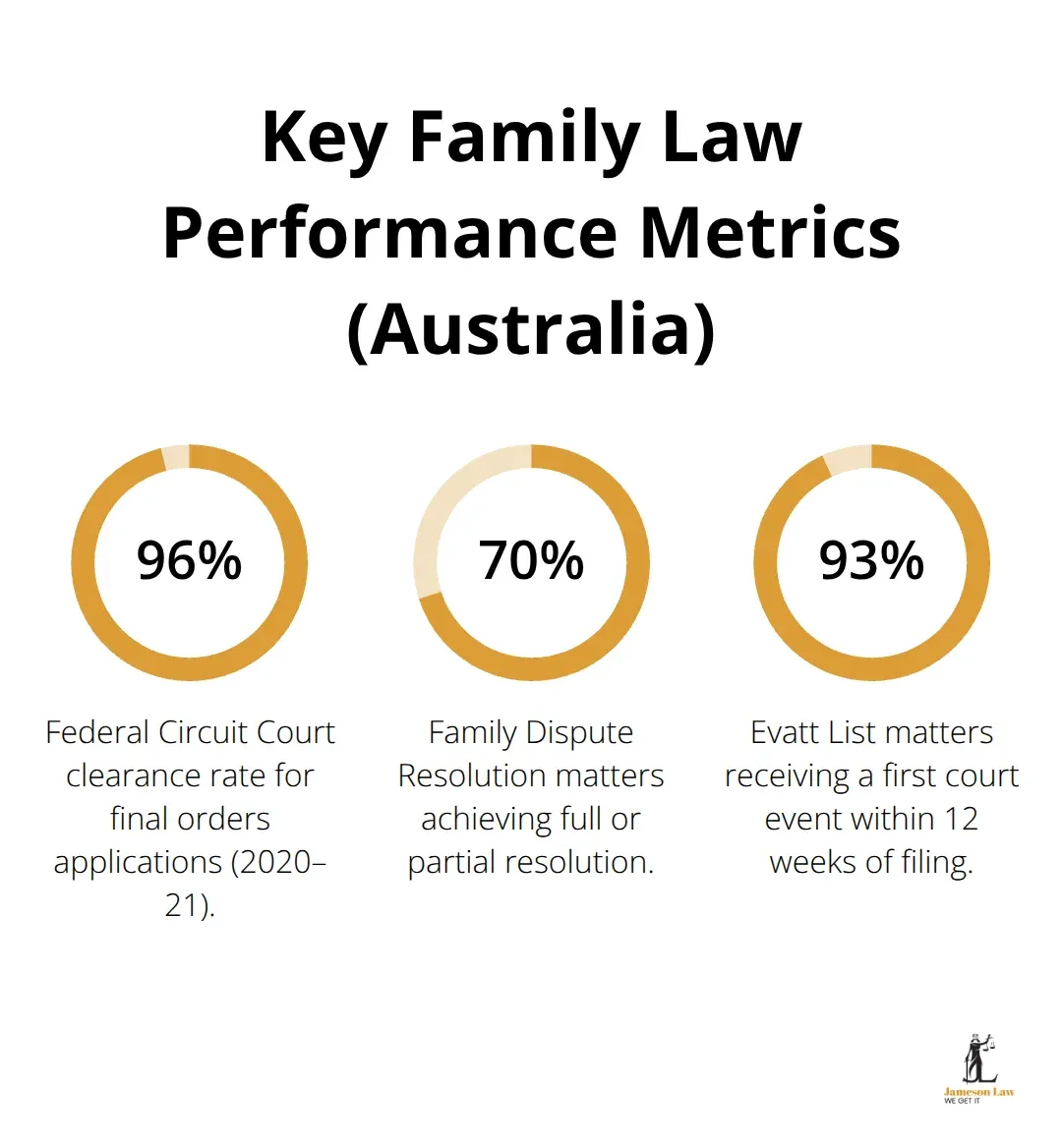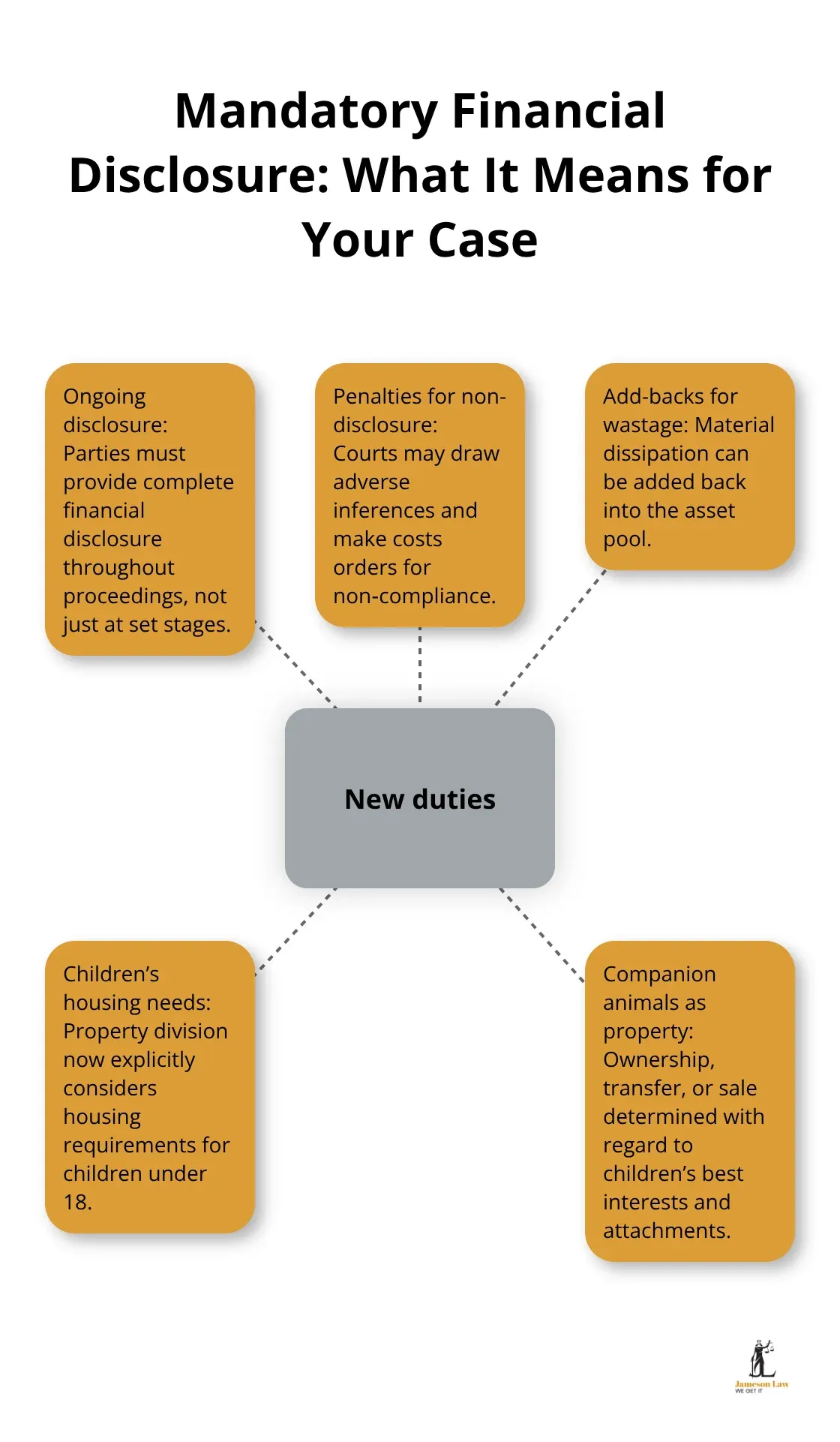Australia’s family law landscape shifted dramatically in 2024, with several groundbreaking court decisions reshaping how property settlements and custody arrangements are handled.
Recent family law cases in Australia have introduced new precedents that directly impact separating couples and their legal strategies. We at Jameson Law have tracked these developments closely to help families in Parramatta and Sydney navigate the changing legal environment.
What Changed in Recent Family Court Rulings
The Federal Circuit and Family Court delivered several groundbreaking decisions in 2025 that fundamentally altered how Australian families approach separation proceedings. The Pantoja & Pantoja case from August 2025 marked a watershed moment when the court adjusted property distribution in favour of a family violence victim. This ruling established that domestic abuse directly impacts financial contributions during property settlements, contradicting decades of precedent where family violence rarely influenced asset division calculations.
Property Settlement Breakthroughs
The court’s decision in Fing & Ma emphasised strict adherence to pleadings in family law proceedings. This forces parties to present their complete financial case upfront rather than amend claims during trial. Courts began to recognise companion animals as divisible property under updated Family Law Act provisions, with judges now determining pet ownership, transfers, or sales post-separation.
The Federal Circuit Court maintained a 96% clearance rate for final orders applications during 2020-21, processing 89,373 family law applications (with divorce cases comprising 51.1% of filings). A concerning trend emerged where one father used artificial intelligence to generate court documents containing fictitious case citations, highlighting new challenges in legal documentation integrity.

Custody and Parental Rights Evolution
Parenting order decisions increasingly prioritise children’s psychological safety over traditional parental access rights. The Gerado & Gerado case from May 2025 demonstrated this shift when courts limited parental time based on comprehensive risk assessments rather than equal time principles.
Courts now require certification from accredited family dispute resolution practitioners before accepting parenting applications. Family Dispute Resolution (FDR) conferences achieve full or partial resolution in 70% of cases. The Evatt List manages high-risk family law cases, with 93% of matters receiving their first court event within 12 weeks of filing and 43% of risk screens indicating high-risk classifications for litigants experiencing family violence.
Financial Disclosure Requirements
The Family Law Amendment Act 2024 introduced a new statutory duty of full and frank financial disclosure. Parties must now disclose all financial circumstances throughout proceedings, promoting transparency in property settlements. Courts follow a structured four-step process when dividing property to achieve just and equitable outcomes.
These procedural changes create a foundation for understanding how new legislative amendments will reshape family law practice across Australia.
What Legislative Changes Are Reshaping Family Law
The Family Law Amendment Act 2024 fundamentally transformed how Australian families navigate separation proceedings, with sweeping reforms that took effect in June 2025. These changes affect every aspect of family law practice, from property division to parental arrangements. The new legislation introduces a mandatory four-step process for property settlements that courts must follow, which replaces the previous discretionary approach that created inconsistent outcomes across different jurisdictions. Courts now must consider economic and financial abuse as forms of family violence when they determine property contributions, which marks a radical departure from traditional asset division principles.
Mandatory Financial Disclosure Revolution
The most significant change affects financial transparency requirements. Parties must now provide complete financial disclosure throughout all proceedings, not just at specific stages. This statutory duty extends beyond initial applications to cover ongoing obligations during negotiations and court hearings.

Courts can impose severe penalties for non-disclosure, which include adverse inferences about hidden assets and costs orders against non-compliant parties. The legislation specifically addresses material wastage of property or financial resources, which allows courts to add back dissipated funds to the asset pool. Housing needs for children under 18 now receive explicit consideration in property division calculations (often resulting in larger settlements for the primary caregiver). Companion animals receive formal recognition as divisible property, with courts determining ownership, transfers, or sales based on the children’s best interests and emotional attachments.
Streamlined Divorce and Parenting Processes
Divorce applications now follow uniform processes regardless of marriage duration or children involvement, which eliminates the previous two-year marriage counselling certificate requirement. The separation period remains 12 months, but court attendance is no longer mandatory for sole divorce applications, even when children are involved. Parenting applications require certification from accredited family dispute resolution practitioners before filing (which forces mediation attempts and reduces court congestion). Those who use family dispute resolution are more satisfied (73.6%) than other approaches.
Impact on Legal Practice and Strategy
These procedural changes create faster, less adversarial pathways for families while they maintain protective measures for high-risk situations involving family violence. Top family law solicitors in Sydney must now adapt their strategies to accommodate stricter disclosure requirements and structured property division processes. The emphasis on pre-court resolution fundamentally alters how lawyers approach case preparation and client counselling. These legislative reforms set the stage for examining how recent court decisions and new laws collectively impact Australian families and reshape legal practice across the country.

How Do These Changes Affect Your Family Law Case
These legislative and judicial changes create immediate consequences for couples who separate across Australia. Property settlements now require exhaustive financial documentation from the outset, which means parties cannot withhold information and reveal it strategically during negotiations. The structured four-step property division process eliminates judicial discretion that previously allowed for wildly different outcomes in similar cases.
New Requirements for Pet Ownership Disputes
Couples with companion animals must now prepare evidence about pet care responsibilities and emotional bonds with children. From 11 June 2025, pets will be considered “companion animals” and will be a specific category of property that require formal determination. Family violence victims gain substantial advantages in property settlements, with courts required to consider economic abuse and its impact on contributions. The mandatory 12-month separation period remains unchanged, but streamlined divorce processes mean uncontested applications resolve faster without court appearances.
Complete Financial Transparency From Day One
Legal practitioners in Parramatta must fundamentally restructure their approach to family law cases. Front-loaded complete financial disclosure prevents the traditional strategy of gradual information release during negotiations. Lawyers now spend significantly more time on case preparation and documentation before they file applications. The requirement for family dispute resolution certification means practitioners must exhaust mediation options before court proceedings, which shifts focus toward collaborative resolution strategies.
Higher Stakes for Legal Compliance
Success rates for properly prepared cases increase dramatically, while unprepared parties face severe penalties for non-compliance. Courts impose costs orders against legally aided parties who lose eligibility mid-proceedings (which creates financial risks for those with circumstances that change). The Evatt List processes high-risk cases within 12 weeks, but this expedited timeline demands immediate preparation of comprehensive evidence packages.

Professional legal guidance from a family lawyer in Sydney becomes essential rather than optional, as procedural complexity increases substantially under the new framework commencing 10 June 2025.
Final Thoughts
Recent family law cases in Australia have fundamentally transformed how separating couples navigate property settlements and parenting arrangements. The Family Law Amendment Act 2024 introduces mandatory financial disclosure requirements that eliminate strategic information withholding. Courts now follow structured four-step property division processes that create consistent outcomes across jurisdictions.
These changes mean families face stricter compliance requirements from the moment they file applications. Property settlements must account for family violence impacts, companion animals receive formal recognition as divisible assets, and parenting applications require mediation certification before court proceedings. The Pantoja & Pantoja case demonstrates how domestic abuse now directly influences financial contributions (while the Fing & Ma decision reinforces strict adherence to initial pleadings).
Professional legal guidance becomes essential rather than optional under this new framework. The complexity of mandatory disclosure obligations, structured property division processes, and expedited high-risk case management through the Evatt List demands expert navigation. We at Jameson Law, as expert family lawyers in Sydney and Parramatta, help families understand these requirements and develop strategies that comply with new legislative standards while protecting their interests throughout separation proceedings.
Disclaimer
The above is general legal information and should not be considered legal advice. You should speak with one of our lawyers for legal advice tailored to your specific legal matter. The courts and tribunals deal with matters on a case-by-case basis. Our lawyers are based in Parramatta and Sydney, we cannot assist with legal advice in a range of jurisdictions whether in Melbourne, Brisbane, Adelaide or Perth.













